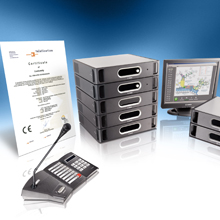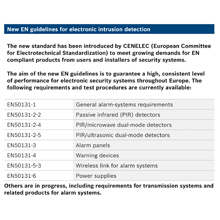 |
| Bosch's equipment, design, installation meet demanding criteria |
With the one of the largest installed bases of security solutions in the world, the name of Bosch has become synonymous with quality and innovation in public address & voice evacuation, conference systems, personal security, CCTV, intrusion and fire-alarm systems, and integrated building and alarm management. The company is committed to producing systems and components that are fully compliant with the latest and most demanding quality and safety standards, and provides solutions for applications ranging from small commercial premises and schools to large-scale public buildings, leisure facilities, harbors, offshore oil & gas platforms and transport terminals such railway stations and airports.
To guarantee truly effective security, the equipment itself as well as the design, installation and commissioning of security installations must meet demanding criteria. Here, international standardization plays a vital role. International standardization organizations “promote safety, quality and technological compatibility in order to create the basic infrastructure that underpins society while promoting sustainability and good regulatory practice.” In other words, the standards provide the minimum requirements that manufacturers and engineering companies in the marketplace have to meet in their offerings.
Committed to the most demanding standards
The goal of innovation at Bosch is ‘positive change’, i.e. the development and manufacture of products that answer the needs of the security market in the most effective possible way. Innovation for Bosch also means striving for full compliance to international quality and safety standards in the security market. In this respect, Bosch is committed to complying with more than just the minimum requirements, and its ambition is always to remain at the forefront of this field. An excellent illustration here of Bosch’s vision is airport security.
Transport terminals in airports in particular are high risk areas demanding strict safety measures. The common claim is that air travel is much safer than traveling by road. And whilst this is due primarily to ongoing improvements in aircraft design, it’s also due in large measure to improvements in ground security systems to ensure the highest possible levels of safety for the traveling public and staff.
The millions of travelers passing through an airport every year are mostly unaware of the advanced technology that today lies behind the security systems, and take these systems for granted. In contrast, international organizations, national governments, airport authorities and airlines cannot be complacent and have to constantly strive to improve the existing security protection of airports. And in this respect, certification to international and national standards helps to accomplish this security protection for for all sizes of airports.
Meeting strict standards in Public Address and Voice Alarm systems
A Public Address & Voice Alarm System (PAVA system) is used for public announcements, scheduled events, background music and directing people to safety in emergency situations. The PAVA system is expected to operate at all times and at every place. Guarantee of correct operation starts with the implementation of the relevant standard’s requirements during development of a product, and is further supported by ensuring that the installation of the system in the field also complies with the standard. The products and installations support the aims of the international organizations, national governments, airport authorities and airlines.
 |
| The goal of innovation at Bosch is 'positive change' |
As evidence of how seriously Bosch takes these national and international standards, the company participates globally in multi-disciplinary commissions that help to define the standards and local implementation of the standards. In addition to this, the Bosch’s Praesideo Public Address and Voice Alarm system is fully certified to the EN 54-16 and EN 60849 standards by TÜV (one of Europe's leading independent authorities), and the Bosch production sites are also fully certified to ensure that all products leaving the factory fulfill the relevant requirements. Unfortunately only few suppliers offer this commitment to product certification.
The use of certified equipment in security systems is, however, just one aspect of compliance. Bosch takes its commitment far further than this by actively supporting a worldwide based network of dealers by means of training courses, knowledge bases and design tools.
This support is of great importance for promoting standards like ISO 7240-19, which are set up to safeguard system design and installation of Public Address and Voice Alarm systems, and specify the planning, the installation, the commissioning and the service requirements for emergency sound systems.
Specific topics in these standards are, moreover, related to an in-depth knowledge of the product, system and system configuration. For example it goes without saying that an emergency sound system must be capable of broadcasting intelligible speech, and in this respect the acoustic environment, the selection of loudspeakers and the placement of these speakers have great effect on clear and unambiguous communication.
Another topic of interest is the need to interconnect with a fire alarm system where provided, and here installers who do not have a sound working knowledge of both systems’ interface possibilities and communication protocols are at a disadvantage.
A system’s power supply also plays an important role in guaranteeing reliable operation. The standards require that in the event of loss of the main power source, a standby-power-source must be available to power the emergency sound system. In this perspective, the correct calculation of the standby power requirement is of great importance for securing evacuation in hazardous situations.
As a final example of the complexity of setting up an effective installation, one could consider the requirements of supervision and redundancy of transmission paths. This requires considerable experience and know-how, especially to correctly calculate loudspeaker characteristics, as well as to select and install the loudspeakers and loudspeaker cabling.
Fire alarm systems
The implementation of the EN 54 norms for fire protection, especially for fire detection technology, has still not been completed despite the standard’s long history. There are two major reasons for this. Firstly, the replacement of national norms by European norms is taking longer than originally planned because the national norms (as well as other codes and guidelines) need to be revised and adapted to the European Regulations. Secondly, new technologies are finding their way into fire alarm systems and this has an impact on the performance of control panels and the corresponding peripherals. This results in a need for new norms, which can be only be created when the new technological solutions emerge.
These problems, however, have not hindered Bosch in its adoption of the norms in its latest developments. The Bosch Fire Panel 1200 Series and Modular Fire Panel 5000 Series both meet all relevant European Standards including the latest requirements of EN54-2 A1 and EN54-4 A2.
Intrusion alarm systems
A new single set of European standards for electronic intrusion detection systems – the EN50131 standards – was introduced several years ago aimed at unifying and improving existing national standards. The result of this initiative is a set of regulations that manufacturers, distributors, installers and end users must all follow. Moreover, countries without clear guidelines or with no guidelines at all will be able to benefit from a clear set of European standards outlining specification levels and requirements for security products. The standards will also enable end users to compare similar products, services and systems.
Recognizing the importance of the new EN50131 standards to their sales in Europe, many manufacturers are making rather enthusiastic claims for their intruder-alarm products based on self evaluation. However, for the new EN50131 standards to gain credibility and become widely accepted throughout the industry, it is essential for products to be certified by independent laboratories and not by the manufacturers themselves. A self declaration of compliance to EN50131-2-4, for example, provides absolutely no guarantee of product quality or product features.
As in other industries, the certification process must be carried out by a completely independent laboratory. This will ensure that the entire security industry, from the manufacturers, distributors, installers through to the end users, can implicitly trust the quality and function of the standards. Independent certification will also give recognition to the work of system manufacturers' R&D departments as well as the combined efforts of national and European associations to promote the correct implementation of the guidelines. And most important, it will mean that the end user can be confident of receiving a product that meets all the new standard’s relevant requirements.
For this reason, many national laboratories such as CNPP (Centre Nationale de Prevention et de Protection) in France, VdS (VdS Schadenverhütung GmbH) in Germany and ANPI (Association Nationale pour la Protection contre l'Incendie et le vol) in Belgium have already initiated product testing based on the available EN standards and technical specifications.
As a member of the CENELEC committee developing the EN50131 standards, Bosch Security Systems has been a strong supporter of the standard as an important quality label on which installers, distributors and end users can rely. It is also one of the first companies to submit its intrusion alarm products for independent certification. The relevant certificates, issued by CNPP, are published on the Bosch website and the company is making test reports available to potential customers on request to provide a guarantee of product quality based not only on a self declaration but also rigorous testing by an independent organization.
Promoting the standards through the Bosch dealer network
The members of the Bosch dealer network have, moreover, followed in depth training courses to help promote the new standards. They also have access to a knowledge base of selection and design tools and are backed up by local and regional sales support teams from Bosch. For selected members of its dealer network, Bosch also runs a certified partner program, acting as a technical training platform for highly specialized installers. This allows installers to deliver not only certified products or systems, but certified configurations, compliant to international and local standards.




